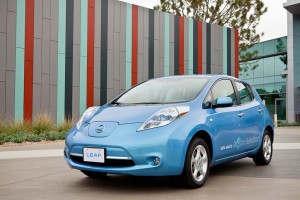After watching its top battery car competitor, the Chevrolet Volt, snag several key endorsements, the 2011 Nissan Leaf has landed a big one of its own. The compact battery-electric vehicle, or BEV, has been named European Car of the Year, overcoming tough competition from an assortment of conventional and “green” products.
Leaf’s victory not only marks the first time a battery car has won the influential award but the first time an electric vehicle has simply made it into the final round, where Nissan’s entry was pitted against the Alfa Romeo Giulietta, Opel Meriva, Citroen C3/DS3, Dacia Duster, Ford C-Max and Volvo S60.
“This award recognizes the pioneering zero-emission Nissan Leaf as competitive to conventional cars in terms of safety, performance, spaciousness and handling,” said Nissan CEO Carlos Ghosn as he accepted the annual award. “It also reflects Nissan’s standing as an innovative and exciting brand with a clear vision of the future of transportation, which we call sustainable mobility.”
The Nissan Leaf bested its nearest competitor by a modest 9 points, scoring 257 points to the Giulietta’s 248. It was clear that the 58 European Car of the Year jurors spent plenty of time debating not just the basics of the Nissan electric car but the challenges battery vehicles, in general face.
“In spite of the lack of a large recharging network and the limited range, the LEAF represents a technical and commercial bet that might otherwise satisfy many potential consumers, especially where public incentives will come to reduce the paying price,” they concluded, according to chief juror Hakan Matson.
(To read TheDetroitBureau.com’s review of the 2011 Nissan Leaf, Click Here.)
Leaf has won several other significant awards in recent weeks. It was named Green Car of the Year by Britain’s TheGreenCarWebsite.com, for one thing. But the Chevrolet Volt has led with key third-party endorsements including the influential Motor Trend Car of the Year, Automobile magazine’s Automobile of the Year, and Green Car Journal’s Green Car of the Year. (Click Here for more.)
Leaf has won several other awards in recent weeks. It was named Green Car of the Year by Britain’s TheGreenCarWebsite.com, for one thing. But the Chevrolet Volt has led with key third-party endorsements in the U.S., notably including the influential Motor Trend Car of the Year award, Automobile magazine’s Automobile of the Year, and Green Car Journal’s Green Car of the Year. (Click Here for more.)Yet to be determined is the battle for the North American Car of the Year. Finalists will be announced in mid-December, and both Volt and Leaf are widely expected to be among the five car choices. The NACOTY winner will be revealed at the opening of the 2011 North American International Auto Show, in Detroit, on January 10, 2011.
In the U.S., Leaf goes for $32,780, but the vehicle qualifies for a variety of incentives, including a federal tax credit of $7,500.
The vehicle passed a significant milestone, earlier this month, when it was given a formal mileage rating by the Environmental Protection Agency of 99 mpg-e, a figure that is designed to reflect the battery car’s fuel efficiency equivalent if it were running on gasoline. The EPA also determined a 73 mile range per charge using a five-test average. The maker has been targeting a range of 100 miles, though Nissan stresses that can vary widely depending upon road conditions, weather and driver behavior.
Leaf will initially go on sale in California and a handful of other warm weather states before beginning a nationwide roll-out that will extend through the rest of 2011. The Japanese launch is also set for next month. In Europe, an early 2011 debut is planned, starting with Portugal, Ireland, the U.K. and the Netherlands.
During his speech, Ghosn noted that Nissan – and its luxury brand, Infiniti – are currently developing three more battery cars, while the Japanese maker’s European affiliate, Renault, has four additional electric vehicles in the pipeline. By mid-decade, the alliance partners will have a global capacity in place to produce as many as 550,000 BEVs annually.

